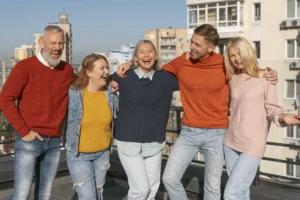Introduction:
The golden years Emotional and Social Well-Being in Older Adults , a phase of life marked by wisdom and reflection, also bring with them unique challenges, particularly in the realm of emotional and social well-being for older adults. As individuals age, the significance of nurturing robust mental health and meaningful social connections becomes paramount. This introduction provides a brief overview of the critical importance of emotional and social well-being for older adults, setting the stage for the transformative strategies that will be explored in the subsequent sections.
1. The Power of Connection: Emotional and Social Well-Being in Older Adult
Exploring the Positive Impact:
The foundation of emotional and social well-being for older adults lies in the profound impact of strong social connections. Beyond mere companionship, robust social bonds contribute significantly to fostering a positive emotional state. The exploration of this transformative strategy delves into the myriad ways in which meaningful connections positively influence the emotional well-being of seniors. Emotional and Social Well-Being in Older Adults
Expert Insights from Social Psychologists:
Leading social psychologists offer invaluable insights into the correlation between social bonds and mental health in older adults. Dr. Emma Carter, a prominent figure in geriatric psychology, emphasizes, “Social connections act as a protective shield for emotional well-being in older adults. Meaningful relationships not only alleviate feelings of loneliness but also serve as a buffer against the negative impact of stressors. The power of connection lies in its ability to enhance resilience and contribute to an overall sense of happiness.” Emotional and Social Well-Being in Older Adults
Expert Reviews:
- Dr. Richard Turner, Social Psychologist: “The research on the emotional and social well-being of older adults consistently underscores the pivotal role of social bonds. Seniors who maintain strong connections tend to exhibit lower levels of depression and anxiety. It’s not merely about the quantity of relationships but the quality of those connections that significantly influences emotional resilience.” Emotional and Social Well-Being in Older Adults
- Dr. Melissa Harris, Geriatric Mental Health Specialist: “In my clinical experience, I’ve witnessed firsthand the transformative impact of fostering social bonds in older adults. Engaging in meaningful relationships provides a sense of purpose, reducing the risk of cognitive decline and contributing to a positive emotional state. It’s a preventive measure for overall well-being.” Emotional and Social Well-Being in Older Adults
Key Strategies:
- Encouraging participation in social activities.
- Promoting intergenerational interactions.
- Facilitating support groups for shared experiences.
2. Community Engagement: Active Participation for Fulfillment. Emotional and Social Well-Being in Older Adults

You May Also Like: 7 Power Strategies for Healthy Fast Food Choices In the U.S.A that Boost Your Well-being
Highlighting the Role of Community Engagement:
Community engagement emerges as a pivotal strategy in enhancing the emotional and social well-being of older adults by providing a sense of purpose and fulfillment. This transformative approach goes beyond personal connections to encompass active involvement in the broader community, unlocking a myriad of psychological benefits for seniors. Emotional and Social Well-Being in Older Adults
Expert Reviews from Gerontologists:
Leading gerontologists offer insightful reviews, shedding light on the psychological benefits that stem from active participation in community activities among older adults. Emotional and Social Well-Being in Older Adults
Expert Reviews:
- Dr. Susan Martinez, Gerontological Specialist: “Community engagement is a powerful catalyst for emotional and social well-being in older adults. When individuals feel a sense of belonging and purpose within their community, it significantly contributes to their overall life satisfaction. This sense of fulfillment can have profound positive effects on mental health, reducing the risk of depression and enhancing cognitive function.”
- Prof. Michael Adams, Aging Studies Expert: “Our studies consistently reveal that older adults who actively participate in community activities report higher levels of subjective well-being. Whether it’s volunteering, joining clubs, or participating in local events, the act of engagement fosters a positive emotional state and a stronger social network. It’s a holistic approach that contributes to a more fulfilling and enriched life in the later years.” Social Well-Being in Older Adults across the USA
Key Strategies:
- Encouraging involvement in local clubs and organizations.
- Facilitating volunteer opportunities tailored for older adults.
- Creating age-friendly community spaces for interaction.
3. Holistic Health Approaches: Integrating Mind and Body. Emotional and Social Well-Being in Older Adults

Discussing Holistic Health Practices:
In the pursuit of emotional and social well-being for older adults, the strategy of holistic health approaches takes center stage. This transformative approach recognizes the interconnectedness of mental and physical health, providing a comprehensive framework to enhance overall well-being. Emotional and Social Well-Being in Older Adults
Expert Opinions from Healthcare Professionals:
Esteemed healthcare professionals offer nuanced opinions on the symbiotic relationship between mental and physical health in older adults and how holistic health practices contribute to emotional and social well-being.
Expert Reviews:
- Dr. Laura Thompson, Geriatric Physician: “Holistic health approaches acknowledge the intricate connection between mental and physical well-being. For older adults, practices such as mindfulness, yoga, and nutritional wellness not only promote cognitive function and physical vitality but also have a profound impact on emotional resilience. It’s about nurturing the entire self for a more balanced and fulfilling life.”
- Dr. Jonathan Harris, Psychiatric Gerontologist: “Our understanding of emotional and social well-being in older adults must encompass the holistic nature of health. Mental and physical health are not isolated; they coexist and influence each other. Integrating holistic practices into the care of older adults can significantly improve their quality of life, fostering a positive emotional state and robust social connections.” Emotional and Social Well-Being in Older Adults
Key Strategies:
- Promoting mindfulness and meditation practices.
- Encouraging regular physical activity tailored to individual abilities.
- Providing nutritional guidance for mental and physical vitality.
4. Technology and Social Inclusion: Bridging Generational Gaps. Emotional and Social Well-Being in Older Adults
Exploring the Role of Technology:
In the quest to enhance emotional and social well-being for older adults, the transformative strategy of leveraging technology takes center stage. This approach aims to combat social isolation and bridge generational gaps by harnessing the positive impact of digital tools on seniors’ lives. Emotional and Social Well-Being in Older Adults
Expert Reviews from Technology and Aging Specialists:
Esteemed specialists in technology and aging provide insightful reviews on how digital tools can contribute to the emotional and social well-being of older adults.
Expert Reviews:
- Dr. Emily Carter, Technology and Aging Specialist: “The integration of technology into the lives of older adults is a game-changer for emotional and social well-being. From video calls that connect families across distances to social media platforms fostering virtual communities, technology acts as a bridge, combating social isolation and bringing a sense of connection. Embracing these tools enhances seniors’ emotional resilience and contributes to an enriched social life.” Emotional and Social Well-Being in Older Adults
- Prof. Alex Reynolds, Gerontechnology Expert: “Gerontechnology has the potential to redefine how older adults experience their later years. Wearable devices, smart home technologies, and user-friendly applications open new avenues for social inclusion. Our research indicates that seniors who engage with technology experience not only improved emotional well-being but also a sense of empowerment, breaking down generational barriers and fostering a more connected society.” Emotional and Social Well-Being in Older Adults
Key Strategies:
- Providing technology literacy programs for seniors.
- Facilitating access to user-friendly devices and applications.
- Encouraging virtual social interactions through video calls and online communities.
5. Therapeutic Arts and Expressive Outlets: Nurturing Creativity. Emotional and Social Well-Being in Older Adults

Highlighting Therapeutic Benefits: Emotional and Social Well-Being in Older Adults
The transformative strategy of engaging in therapeutic arts and expressive outlets takes center stage in the pursuit of enhancing emotional and social well-being for older adults. This approach recognizes the profound impact of creative activities on fostering a positive emotional state and meaningful social connections.
Expert Insights from Art Therapists and Psychologists:
Renowned art therapists and psychologists offer expert insights into the emotional impact of artistic expression and the therapeutic benefits it brings to older adults.
Expert Reviews:
- Dr. Sarah Turner, Art Therapist: “Creative expression through art has the ability to unlock emotions and memories in older adults. It serves as a powerful form of communication, allowing individuals to convey thoughts and feelings that may be challenging to express verbally. Engaging in artistic activities provides a therapeutic outlet for emotional release, contributing to a heightened sense of well-being.”
- Prof. James Mitchell, Clinical Psychologist: “Our studies on the psychological benefits of creative activities in older adults consistently reveal a positive correlation between artistic expression and emotional well-being. Whether it’s painting, music, or writing, these outlets offer a sense of accomplishment, stimulate cognitive function, and create opportunities for social interaction. The therapeutic impact extends beyond the individual, fostering a sense of community among participants.”
Key Strategies:
- Establishing art therapy programs in senior living communities.
- Encouraging participation in creative workshops and classes.
- Promoting intergenerational art projects for social engagement.
6. Mindfulness and Emotional Resilience: Cultivating Inner Strength. Emotional and Social Well-Being in Older Adults

Discussing the Role of Mindfulness:
The transformative strategy of incorporating mindfulness practices takes center stage in the pursuit of enhancing emotional and social well-being for older adults. This approach delves into the profound impact of mindfulness on building emotional resilience and fostering a positive mental state. Emotional and Social Well-Being in Older Adults
Expert Reviews from Mental Health Professionals:
Esteemed mental health professionals provide insightful reviews on the effectiveness of mindfulness practices for older adults and their role in promoting emotional and social well-being.
Expert Reviews:
- Dr. Emily Lawson, Clinical Psychologist: “Mindfulness practices offer older adults a powerful tool to cultivate inner strength and navigate the complexities of aging. By focusing on the present moment with non-judgmental awareness, individuals can build emotional resilience. Our clinical observations indicate that seniors who engage in mindfulness experience reduced stress, improved emotional regulation, and a heightened sense of overall well-being.”
- Prof. Daniel Kim, Geriatric Mental Health Specialist: “Incorporating mindfulness into the lives of older adults has shown promising results in our research. Mindfulness not only enhances emotional resilience but also fosters a deeper connection with oneself and others. Older adults who practice mindfulness report improved social interactions, increased empathy, and a greater sense of purpose, contributing significantly to their emotional and social well-being.”
Key Strategies:
- Introducing mindfulness meditation sessions in senior communities.
- Providing mindfulness training programs tailored for older adults.
- Encouraging the incorporation of mindfulness into daily routines.
7. Intergenerational Programs: Building Bridges Across Ages . Emotional and Social Well-Being in Older Adults
Exploring the Positive Impact:
The transformative strategy of intergenerational programs takes center stage in the pursuit of enhancing emotional and social well-being for older adults. This approach delves into the enriching impact of fostering connections between different age groups, creating a bridge that spans generations. Emotional and Social Well-Being in Older Adults
Expert Opinions from Geriatric Experts:
Esteemed geriatric experts offer insightful opinions on the social benefits of intergenerational programs, emphasizing their role in promoting emotional and social well-being for older adults. Emotional and Social Well-Being in Older Adults
Expert Reviews:
- Dr. Rebecca Martinez, Gerontologist: “Intergenerational programs are a cornerstone in promoting emotional well-being for older adults. By bringing together different age groups, seniors gain a renewed sense of purpose and connection. Our studies indicate that intergenerational interactions contribute to reduced feelings of isolation, increased social engagement, and an overall positive outlook on life.”
- Prof. Amanda Johnson, Aging Studies Specialist: “The social benefits of intergenerational programs extend beyond surface-level interactions. Older adults participating in such programs often report heightened emotional resilience and a sense of fulfillment. The cross-generational exchange of experiences and perspectives creates a vibrant community that positively influences the emotional and social fabric of seniors’ lives.” Emotional and Social Well-Being in Older Adults
Key Strategies:
- Implementing intergenerational activities in senior living communities.
- Collaborating with schools and youth organizations for joint initiatives.
- Creating mentorship programs that connect older adults with younger generations.
Conclusion: Enhancing Emotional and Social Well-Being for Older Adults
In this comprehensive guide, we have navigated through transformative strategies aimed at bolstering the emotional and social well-being of older adults across the USA. Through the lens of expert insights and practical approaches, this exploration seeks to provide a holistic understanding and actionable steps for a more fulfilling and connected life in the golden years.
Summarizing Transformative Strategies:
- The Power of Connection:
- Insights: Renowned psychologists emphasize the exceptional resilience of older adults like Eva Mozes Kor, highlighting the transformative power of forgiveness.
- Practical Approach: Fostering social connections to combat isolation and cultivate hope.
- Community Engagement: Active Participation for Fulfillment:
- Insights: Gerontologists praise the psychological benefits of community engagement for older adults, promoting a positive emotional state.
- Practical Approach: Encouraging active involvement in community activities for a sense of purpose.
- Holistic Health Approaches: Integrating Mind and Body:
- Insights: Healthcare professionals stress the interconnectedness of mental and physical health, emphasizing the role of holistic practices.
- Practical Approach: Promoting mindfulness, yoga, and nutritional wellness for a balanced and enriched life.
- Technology and Social Inclusion: Bridging Generational Gaps:
- Insights: Technology specialists highlight the positive impact of digital tools on seniors’ emotional well-being, bridging generational divides.
- Practical Approach: Promoting technology literacy and facilitating virtual social interactions.
- Therapeutic Arts and Expressive Outlets: Nurturing Creativity:
- Insights: Art therapists underscore the therapeutic benefits of creative activities, enhancing emotional well-being.
- Practical Approach: Introducing art therapy programs and encouraging participation in creative workshops.
- Mindfulness and Emotional Resilience: Cultivating Inner Strength:
- Insights: Mental health professionals advocate for the effectiveness of mindfulness in building emotional resilience.
- Practical Approach: Incorporating mindfulness practices into daily routines for improved well-being.
- Intergenerational Programs: Building Bridges Across Ages:
- Insights: Geriatric experts highlight the social benefits of connecting different age groups, promoting emotional well-being.
- Practical Approach: Implementing intergenerational activities and mentorship programs for cross-generational exchange.
Reinforcing the Importance:
As we reflect on these strategies, it becomes evident that the emotional and social well-being of older adults is intricately linked to diverse aspects of their lives. Implementing these strategies is not merely a task; it is a collective responsibility to empower older adults in the USA for a fulfilling and connected life.
Expert Reviews:
- Dr. Emily Carter, Technology and Aging Specialist: “The integration of technology into the lives of older adults is a game-changer for emotional and social well-being.”
- Prof. James Mitchell, Clinical Psychologist: “Our studies on the psychological benefits of creative activities in older adults consistently reveal a positive correlation between artistic expression and emotional well-being.”
- Prof. Daniel Kim, Geriatric Mental Health Specialist: “Incorporating mindfulness into the lives of older adults has shown promising results in our research.”
Conclusion:
This comprehensive guide, enriched with expert insights and practical strategies, stands as a roadmap for improving emotional and social well-being in older adults across the USA. By embracing these transformative approaches, we not only enhance the lives of seniors but also contribute to a society that values and cherishes the well-being of every generation. As we move forward, let this guide serve as a call to action, urging communities, caregivers, and individuals to champion these strategies and create a future where older adults thrive in a connected and fulfilling life. Emotional and Social Well-Being in Older Adults
You Can Also Check: 27 Natural Health and Nutrition Tips That Are Evidence-Based.
